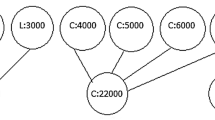Abstract
Government by majority rule voting is a mixture of voting and bargaining. Bargaining among people with moderately different objectives is indispensable for the passage of laws and the formation of public policy. Little of the nation’s business could be transacted without an ability on the part of the legislators and members of political parties to strike bargains, but that same ability to strike bargains makes possible the exploitation of minorities by majorities which, beyond some limit, destroys democratic government. Rules and customs are designed to foster bargaining in the one context and to thwart bargaining in the other.
Similar content being viewed by others
References
Aristotle (1946). The politics of aristotle. Oxford: Clarendon Press (edited and translated by Ernest Barker).
Baron, D., & Frerejohn, J. (1989). Bargaining in legislatures. American Political Science Review, 1181–1206.
Besley, T., & Coate, S. (1997). An economic model of representative democracy. Quarterly Journal of Economics, 65–95.
Black, D. (1948). On the rationale of group decision making. Journal of Political Economy.
Black, D., Newing, R.A. (1958). The theory of committee and elections. Cambridge: Cambridge University Press.
Chua, A. (2003). World on fire: how exporting free market democracy breeds ethnic hatred and global instability. New York: Doubleday.
Dunn, J. (2005). Democracy, a history. New York: Atlantic Monthly Press.
Epstein, R. (1985). Takings: private property and the power of eminent domain. Harvard: Harvard University Press.
Farhana, H., & Tse, A. (2009). Comparing the house and senate health care proposals. New York Times, Dec. 19.
Gordon, S. (1999). Controlling the state: constitutionalism from ancient athens to today. Harvard: Harvard University Press.
Hacker, A. (Ed.) (1964). The Federalist Papers by Alexander Hamilton, John Jay and James Madison. New York: Washington Square Press.
Kiewiet, D., & McCubbins, M. (1991). The logic of delegation: congressional parties and the appropriations process. Chicago: UNiversity of Chicago Press.
Kirchgassner, G. (2000). Probabilistic voting and equilibrium: an impossibility result. Public Choice, 35–48.
Mann, M. (2005). The dark side of democracy (p. 2005). Cambridge: Cambridge University Press.
Mueller, D. (2003). Public Choice III. Cambridge: Cambridge University Press.
Newman, P. (1965). The theory of exchange. Englewood Cliffs: Prentice Hall.
Osborne, M., & Rubinstein, A. (1990). Bargaining and markets. San Diego: Academic Press.
Osborne, M., & Slivinski, A. (1996). A model of political competition with citizen-candidates. Quarterly Journal of Economics, 85–114.
Rabushka, A., & Shepsle, K. (1972). Politics in plural societies: a theory of democratic instability. Bellevue: Merrill.
Riker, W. (1980a). Implications from the disequilibrium of majority rule for the study of institutions. American Political Science Review, 432–446.
Riker, W. (1980b). Liberalism versus populism. New York: Freeman.
Riker, W. (1982). The two-party system and Duverger’s law: an essay on the history of political science. American Political Science Review, 753–766.
Shepsle, K., & Weinghast, B. (1981). Structure-induced equilibrium and legislative choice. Public Choice, 503–519.
Shepsle, K., & Weinghast, B. (1987). The institutional foundations of committee power. American Political Science Review, 86–108.
Tullock, G. (1981). The general irrelevance of the general impossibility theorem. Quarterly Journal of Economics, 256–270.
Tilly, C. (2007). Democracy. Cambridge: Cambridge University Press.
Usher, D. (1981). The economic prerequisite to democracy. Oxford: Blackwell Sci.
Usher, D. (1995). The Significance of the probabilistic voting theorem. Canadian Journal of Economics, 433–445.
Usher, D. (2005). Assessing the citizen-candidate model. Public Choice, 43–65.
Usher, D. (November, 2010). Bargaining unexplained. Public Choice.
Woodhouse, A. S. P. (Ed.) (1974). Puritanism and Liberty: being the army debates (1647-9). London: Dent.
Author information
Authors and Affiliations
Corresponding author
Rights and permissions
About this article
Cite this article
Usher, D. Bargaining and voting. Public Choice 151, 739–755 (2012). https://doi.org/10.1007/s11127-011-9768-0
Received:
Accepted:
Published:
Issue Date:
DOI: https://doi.org/10.1007/s11127-011-9768-0




